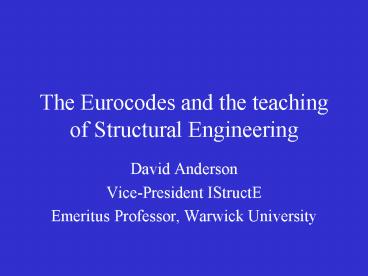The Eurocodes and the teaching of Structural Engineering - PowerPoint PPT Presentation
1 / 16
Title:
The Eurocodes and the teaching of Structural Engineering
Description:
The Eurocodes and the teaching of Structural Engineering. David ... Designers' Handbooks published by Thomas Telford. Worked examples. Software. 19 April 2005 ... – PowerPoint PPT presentation
Number of Views:126
Avg rating:3.0/5.0
Title: The Eurocodes and the teaching of Structural Engineering
1
The Eurocodes and the teaching of Structural
Engineering
- David Anderson
- Vice-President IStructE
- Emeritus Professor, Warwick University
2
The Eurocodes are design rules for civil
engineering structures
3
The Eurocode programme
- 10 Eurocodes including
- EN 1991 Actions Loading on structures
- EN 1992 Concrete structures
- EN 1993 Steel structures
- Other common structural materials
- EN 1997 Geotechnical design
4
The Eurocodes will apply across Europe
5
Eurocodes different from British Standardsbut
much input from the UK
6
Principal aim of the Eurocodes
- To eliminate technical obstacles to trade within
Europe
7
Trade in design services and construction
products
8
The advantages
- Up-to-date design methods based on European best
practice - International harmonisation will help students
and graduates who wish to work abroad - Harmonisation between different materials
- reinforced concrete composite steel-concrete
- Harmonisation between different structures
- buildings bridges
9
The Eurocodes are in EnglishSo less need to
master foreign languages!
10
But there must be some disadvantages?
- Eurocodes represent structural behaviour more
precisely - Deeper understanding required
- Formulae (where given!) may be more complicated
- Design calculations tend to be more lengthy
- So software and design aids are essential
11
Implementation in the UK
- National strategy needed for successful
implementation - IStructE report to ODPM 2004
- Recommendations for engineering community,
including industry, profession, BSI, government - Standing Committee to monitor implementation
12
Needs common to industry and teaching
- Technical manuals
- Commentaries
- Designers Handbooks published by Thomas Telford
- Worked examples
- Software
13
University needs
- Knowledgeable, enthusiastic teachers!
- Curriculum to provide deeper understanding
- Research income and publications
14
Issues on teaching and research
- Eurocodes
- based on past research
- particularly on behaviour of elements
- now a mature subject
- Much structural engineering is taught by mature
staff - Research has (rightly) moved on
- sustainability, risk, managing existing assets
- Universities need research-active staff
15
The challengeHow to provide the teaching that
industry needs with the staff that the university
needs!
16
Topic for a future meeting?































